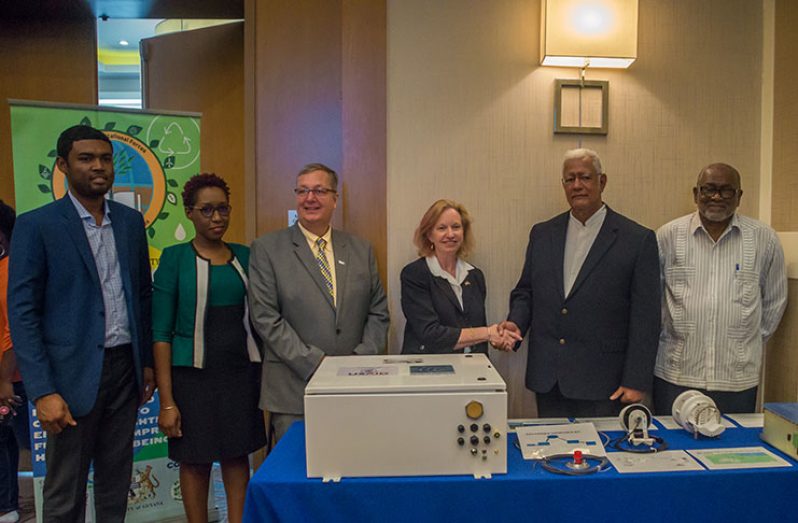GUYANA’S ability to forecast weather patterns and become self-reliant in taking proactive measures to protect it’s people and assets, was enhanced with the acquisition of 21 pieces of climate-monitoring equipment on Friday, as this country joined the rest of the world in observing World Water Day.
WWD is celebrated on March 22 every year, and focuses on promoting sustainable water management and sanitation. At a symposium held at the Guyana Marriott Hotel in observance of the occasion, recently-accredited United States Ambassador to Guyana Sarah-Ann Lynch, handed over one of the climate-monitoring equipment to Agriculture Minister Noel Holder, and noted that the event represents an important step in the strengthening of climate-science networks that are necessary to protect this country’s vast assets from national hazards, and signals the enduring partnership the U.S. Government has with the government and people of Guyana.
The USAID, through its work with the regional institution, the Caribbean Community Climate Change Centre, commonly referred to as the 5Cs, lent its support in building the Region’s adaptive capacity. The 21 automatic weather stations, as well as a computer and two hand-held scanners, will be used by the Hydrometeorological Department to gather data and analyse climate-related events. They were purchased under a U.S. Government’s three-year Climate Change Adaptation Project, to which US$10M is dedicated to create an integrated system for the development and financing of adaptation measures to counter the impact of climate variability, she told the gathering.
According to Ambassador Lynch, the project will build the capacity of regional, national and local partners to generate and use climate data for decision-making in government and other sectors. This involves the procurement, across the region, of critical equipment, including things such as a coral reef early-warning system, a Light Image and Detection and Ranging (LIDAR system), and automatic weather stations and related data-storage equipment.
Alluding to Guyana as having a huge land mass with significant tropical forests and natural resources to protect, Ambassador Lynch reiterated that use of the systems will increase the capability of the country to anticipate and manage inputs of changing weather patterns, saying that with the additional equipment, the expansion of the existing data-generation network will significantly close the gap in nationwide coverage, thus providing scientists and users with new and more reliable data.
Such information is important, she said, because weather forecasts are more credible based on data collected over long periods, and the data produced will be used to make predictions about future weather events, which will be important for planning across all sectors, including agriculture, aquaculture, water resources, coastal zone management, tourism and health sectors.
As an example, farmers will be able to access updated information which they can use to select and plan their planting cycles with greater certainty, the ambassador noted. “As we endure the increasingly varied weather patterns annually, it is important for regional and local practitioners to reflect on the lessons learned from each weather event. What were the predictions and how did a particular event compare? What improvements can be made to a country’s approach? Continuous updating of systems based on new information will ultimately reduce the risks of damage, most importantly including lives saved, as well as using fewer scarce resources to recover from events,” she added, and wished much success in use of the equipment. Minister Holder in delivering the feature address, underscored the sentiments of the previous speakers and reminded of the significance of water and the need to promote sustainability for water-resources management.
He acknowledged the partnership with the U.S. Government and their continued support through the USAID programme, specifically to the climate change adaptation project and the regional 5Cs institution (Caribbean Community Climate Change Centre).
He said the stations will be placed throughout the country in every administrative region where they will be monitored and will add to the 26 existing automatic hydro-meteorological stations, 54 hydrological stations and 196 meteorological rainfall stations currently in operation. They will significantly boost the service capacity to serve the country with measuring and compiling of data and importantly aid in the planning and development in the agricultural sector. In this regard the Hydro-meteorological Service is playing a supportive role in the advancement and development of the agricultural sector in Guyana..
He made mention of the Sustainable Development Goal Number Six, which speaks of ensuring availability and sustainable management of water and sanitation for all.
Minister Holder said, it specifically highlights the pivotal role that the availability and quality of water represents for sustainable development. In a world where it is estimated that by 2050 at least one in four people is likely to live in a country affected by chronic or recurring shortage, the sustainability management of this resource is key to the achievement of all of the related goals, he noted. Other speakers at the forum chaired by Permanent Secretary at the Ministry of Agriculture, Ms Delma Nedd, and which was preceded by a mini exhibition, were: Chief Hydrometeorological Officer (ag) Dr. Gavin Cummings and Deputy Executive Director of the Caribbean Community Climate Change Centre (5Cs), Dr Ultric Trotz.
A panel discussion followed the handing-over ceremony.



.jpg)









